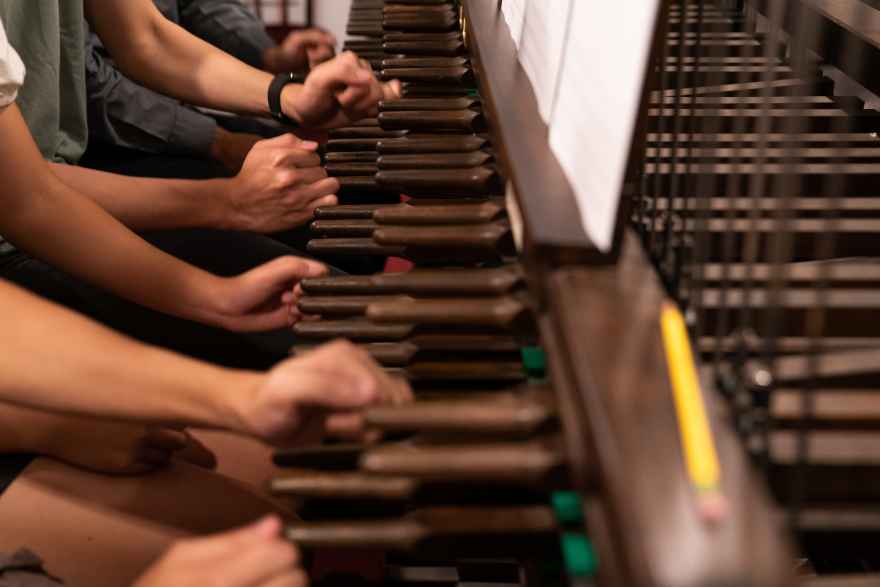Music, Poetry by UChicago Faculty Will Welcome President Alivisatos on Oct. 29

The following was published in UChicago News on Oct. 20, 2021.
By Max Witynski
As the ringing of the carillon bells subsides, a voice crackles over the walkie talkie: “That sounded great!”
Prof. Augusta Read Thomas is calling up to the belltower of Rockefeller Memorial Chapel, where University Carillonneur Joey Brink and his student assistants—fourth-years Emily Kim, Joseph Min and João Francisco Shida—are seated in a row on the carillonneur’s bench, striking large wooden keys with their fists.
They’re practicing a piece that Thomas has composed for the Oct. 29 inauguration of Paul Alivisatos as the 14th president of the University of Chicago. To be played on the University’s 72-bell carillon—a massive instrument suspended within several stories of the tower’s interior scaffolding—the new music is among the works by UChicago faculty that will help set a celebratory tone for the ceremony.
“There are only two carillons in the world with so many bells, so the sound of them ringing together is distinctive and momentous,” said Thomas, the University Professor of Composition in the Department of Music. “It puts sonic waves into the sky that will ripple and shimmer in honor of the new presidency; it’s very metaphorical in a way.”
The four-minute carillon composition shares its title with the University’s motto: “Crescat scientia; vita excolatur,” translated as “Let knowledge grow from more and more; and so be human life enriched.”
A world-renowned composer and the director of the Chicago Center for Contemporary Composition, Thomas wanted the piece to sound optimistic, joyful and majestic. The music will greet inauguration guests shortly after they enter Rockefeller Chapel, before any speeches.
“It puts sonic waves into the sky that will ripple and shimmer in honor of the new presidency.”
The piece’s resounding final chord will also mark the first time all 72 bells of the carillon will be rung at the same time. That chord requires the combined efforts of 12 carillonneurs simultaneously pressing dozens of keys, and another assistant in the basement more than 200 feet below activating an electric circuit that sets in motion the larger “swinging bells”—each the approximate size of a Smart car.
Those bells are so heavy that they cannot be swung by people striking keys. They have never before been played at the same time as all the manually controlled bells.
“It’s sort of a crazy idea to ring every bell at once. Normally, you’d have a three-note chord, or a four-note arpeggio or a six-note run,” Thomas said, demonstrating each on the piano before smashing her forearm into the keyboard to simulate the weight of the final bell chord. “So it’s just extreme … but I like the sonic image of it.”
Another, more meditative piece by Thomas will also be performed at the inauguration: the violin duet “Double Helix,” which will be played by Janet Sung and Yuan-Qing Yu. Originally composed at the request of former President Robert J. Zimmer—now the University’s chancellor—for the 2011 dedication of Mansueto Library, Thomas said the piece felt uniquely appropriate to the inauguration. It was recommended for the program by Anne Walters Robertson, dean of the Division of the Humanities.
“President Alivisatos is a chemist, and the piece is inspired by the [molecular] structure of DNA—a double helix,” Thomas said. As a piece of music about science, “it’s also symbolic of the cross-fertilization of disciplines that UChicago is so well known for.”
In addition to the two works by Thomas, Srikanth “Chicu” Reddy, a professor in the Department of English Language and Literature, will read an excerpt from his epic poem, “Underworld Lit.” The poem follows a character who meditates on life in academia while embarking on a sometimes-humorous, sometimes-frightening journey through different cultures’ mythologies of the afterlife.
“Underworld Lit,” Reddy said, could only have been written at a great university like UChicago, which not only has experts in world literatures but its own “gateways to the underworld”—quiet recesses like the Oriental Institute and the Regenstein Library stacks—where scholars can descend, metaphorically, into spaces filled with the words and voices of the dead.
Reddy admits that the choice might seem incongruous for an inauguration, but thinks the excerpt will be an appropriate way to welcome Alivisatos, AB’81, back to the unique intellectual community that is the University of Chicago.
“I’ll read from the opening pages, which introduce the book, but more importantly will reintroduce the audience—including President Alivisatos—to the University,” said Reddy, who has taught at UChicago since 2003.
One thing Reddy loves about the University is its communal willingness to engage in constructive critique, and to occasionally step back from the seriousness of scholarly endeavor: a kind of humor and openness to growth that is reflected in the book.
“I think people in the University community want to laugh sometimes at the hilarity of the idealism and frustration that this kind of collective enterprise involves,” Reddy said. “So I hope that we can use comedy as a way of thinking critically—and in a joyous way—about what our hopes are for the University as we begin this new era.”